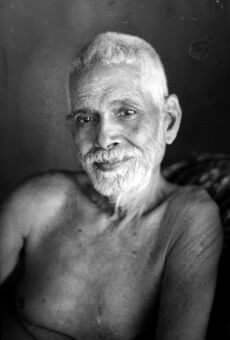Ramana Maharshi

Ramana Maharshi lived from 1879 to 1950, one of the most precious saints that India has ever produced. He is considered to be one of the greatest spiritual teachers of modern India.
Ramana Maharshi was an Indian schoolboy who early realized that his real nature was imperishable and unrelated to his body. He left his family, went to the holy mountain of Shiva, Arunachala, threw away all his possessions and money, and sat down to meditate. His body began to waste away, his hair and fingernails grew to unmanageable lengths, and insects ate away at his legs. He had such a longing for God that nothing else really mattered.
Soon that Christ radiance began to shine through, and he attracted a large following, ultimately becoming one of India’s most popular holy men. He was showing one path of God-realization. And beyond the childlike mind, the mind of God was to be seen clearly reflected in a mature soul who knew one note of cosmic harmony and played it well: communion with the All—he became the All.
Sri Ramana Maharshi taught oneness with the Presence of God, but clothed in the Eastern cosmo-conception. After attaining Self-realization, he taught his thousands of followers for many years in a community near Arunachala. His basic principle was that oneness with God, or the Self, is not an “alien or mysterious state, but the natural condition of man.”[1] How does one become aware of the Self?
The Self is ever-present. Each one wants to know the Self. What kind of help does one require to know oneself? People want to see the Self as something new. But it is eternal and remains the same all along. They desire to see it as a blazing light, etc. How can it be so? It is not light, not darkness. It is only as it is. It cannot be defined. The best definition is ‘I AM THAT I AM’. The srutis [scriptures] speak of the Self as being the size of one’s thumb, the tip of the hair, an electric spark, vast, subtler than the subtlest, etc. They have no foundation in fact. It is only Being, but different from the real and the unreal; it is Knowledge, but different from knowledge and ignorance. How can it be defined at all? It is simply Being.[2]
Ramana Maharshi gave the following teaching on non-attachment to a student who misunderstood renunciation to simply mean giving up all money and leaving his family:
A beginner once said to him: “I want to give up my job and family and stay with you, sir, so that I can be with God.” Maharshi said: “God is always with you, in you. That is what you should realize.”
Questioner: But I feel the urge to give up all attachments and renounce the world.
Maharshi: Renunciation doesn’t mean giving away your money or abandoning your home. True renunciation is the renunciation of desires, passions, and attachments.
Questioner: But single-minded devotion to God may not be possible unless one leaves worldly things.
Maharshi: No: a true renunciate actually merges in the world and expands his love to embrace the whole world. It would be more correct to describe the attitude of the devotee as universal love than as abandoning home to become a monk.
Questioner: At home the bonds of affection are too strong.
Maharshi: If you renounce home when you aren’t ripe for it, you only create new bonds.
Questioner: Isn’t renunciation the supreme means of breaking attachments?
Maharshi: That may be so for someone whose mind is already free from entanglements. But you haven’t grasped the deeper meaning of renunciation. Great souls who have abandoned their homes have done so not out of aversion to family life, but because of their largehearted and all-embracing love for all mankind and all creatures.
Questioner: Family ties will have to be left behind sometime, so why shouldn’t I take the initiative and break them now, so that my love can be equal toward all people?
Maharshi: When you truly feel this equal love for all, when your heart has expanded so much that it embraces the whole of creation, you will certainly not feel like giving up this or that. You will simply drop off from secular life as a ripe fruit drops from the branch of a tree. You will feel that the whole world is your home.[3]
Sources
Mark L. Prophet and Elizabeth Clare Prophet, Lost Teachings on Your Higher Self, chapter 5.
Elizabeth Clare Prophet, June 29, 1992.
Elizabeth Clare Prophet, August 29, 1993.
